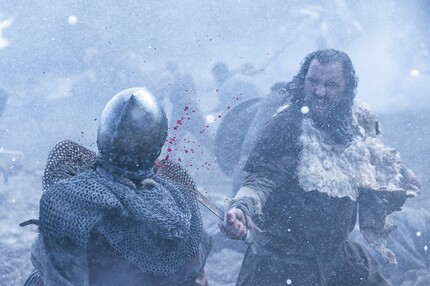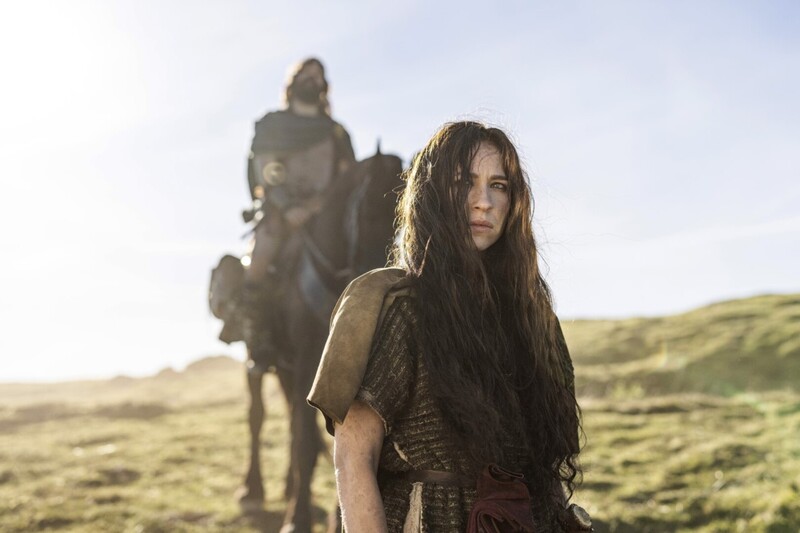Sitges 2022 Review: IRATI, Basque Epic of Pagan Women & Giants

There isn't a culture on the planet without its myths and folklores (or if there is, I don't want to know about it). These are the stories than can tell a people where they came from, who they were, perhaps who they are. They are the legends that make a place. And often they tell the stories of those who have been forgotten, those whose stories have been purposefully left behind. But to name a person, a place, a thing, is to give it value, and that comes from these stories.
Basque director Paul Urkijo burst onto the genre film scene in 2017 with his dark fairy tale Errementari. Now he returns with another Basque-language tale, this time of history and legend. Irati is a grand epic, with gods and monsters, swords and blood, and above all, a story about women, and their power and loss.
It's the 8th century - the Dark Ages - and in the Basque country, as elsewhere in Europe, Christianity has almost wiped out Paganism. Some still hold onto those beliefs, steeped in nature and the earth; one such man makes a pact with Mari, a Goddess, to defeat the invading Franks. But years later, his son Eneko's place as Lord of the Vale is threatened, and Eneko (Eneko Sagardoy) must find his father's bones to give them a Christian burial and reclaim his title. To do this, he needs the help of Irati (Edurne Azkarate), a seeming homeless forest wandered, the only person who knows the location of Mari's cave, and the secret treasures that lie within.
Unlike his father, Eneko seems content to follow the Christian faith; his meeting with Irati, however, seems fated. He might be the Lord of the Vale, but she is the Vale, and this mysticism has far more power than any a forced imposition of a foreign faith could hope to achieve. Irati is well aware of the evils of men, and has little patience for this man; that is, until he shows true devotion and care, both as dictated by the Goddess, and as his own love and lust command. While this might be a legend, it's not hard to imagine the truth behind the story (as most legends have).
The setting is stunning, from mountains and forests to deep and seemingly gigantic caves (all filmed on location), reflecting the legends told therein that are filled with terror, anger, and fire. To say that Urkijo and his team bring this legend to life is an understatement; you absolutely believe in this story, in Irati, and the pagan gods that still linger in their anger over their forgotten names. The richness of the production design is amazing, as are the effects (both practical and computer-generated, and again, we have no trouble accepting any of it as real), but the story that it enhacnes is just as powerful: not only about people vying for power, but gods, and the future of this isolated part of Europe.
But this isn't a general European folktale; this is very much a Basque story, and a woman's story. This part of Europe might be small, but it is unique, not only in language, but how the culture has changed, and Urkijo takes his time to explore and present this unique story. And to put the women front and centre: Irati, both of the earth and of the Gods, steadfast and passionate, Azkarate imbues her character with these qualities - a woman who knows that, in this world of men, she no longer has a place - that we would both be terrified of her, and follow her to the ends of the earth. It is the women who are the heart and fire of the tale, guiding or fighting the men as need be, and sadly, it is they who are forgotten (though not by everyone) as the world moves on.
We don't get enough films like Irati, ones that keep the story grounded to a place and time that is unique and real, a place we can understand from our own corner of the world, while still swept up in the amazing sights, monsters, gods, and legends it brings us. It's a rich fantasy tale grounded in history and people of whom we can still feel the ghosts lingering on the earth.
Irati
Director(s)
- Paul Urkijo Alijo
Writer(s)
- Paul Urkijo Alijo
Cast
- Itziar Ituño
- Eneko Sagardoy
- Nagore Aranburu








